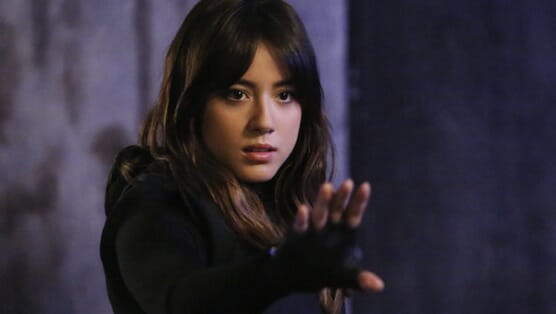Marvel’s Agents of S.H.I.E.L.D.: “The Dirty Half Dozen”
(Episode 2.19)

I can’t with this show right now. Seriously, I just… can’t. Lets back up. You remember my affection for the S.H.I.E.L.D.’s moral grey zone? Well, at its core that moral ambiguity is amazing, not just because it makes for compelling drama, but because it harkens back to everyone’s Philosophy 101 class. More specifically, the moral grey zone asks us to think about our own standards of right and wrong, especially as it’s viewed through the ethics of intention. I know this comes off a bit high brown, but stick with me for a little bit and I’ll show you what I mean.
So, the ethics of intention essentially argues that the results of one’s actions don’t make one inherently good or bad, only the intention behind those actions. After all, “the road to hell is paved with good intentions” is a cliché for a reason. Here’s an example from tonight’s episode. After learning that Hydra has captured Lincoln, Jiaying refuses to send a rescue team. Her intention is a noble one (protecting her people), which for us logically places her on the side of good, but had Skye followed her orders and not gone after Lincoln, it’s very possible that not only he, but the other members of S.H.I.E.L.D. team six would have been captured, or even killed. This result would technically make the action evil, if we were to base morality strictly on results.
As if that’s not complicated enough, we have Raina. Based on her past history with Skye, her own tendencies towards antagonism, and her animosity towards everyone at Afterlife, it’s safe to assume that she didn’t have 100% selfless motives. Still her interference results in Skye being there to help her team and save Lincoln’s life. So, in results based ethics, Raina is “good.” But in a morally grey universe you have to approach characters with moral based on intention, more so than result. Raina’s intentions aren’t necessarily 100% good and that fact taints all of the results of her actions as being inherently negative. Basically you can save a life and still be a bad guy, or you can destroy, I don’t know…say… Harlem, but by doing it with only good intentions you are still a good guy.
And this brings us to the point in last night’s episode where my brain turned to mush. We’re faced with a very important question, True Believers: Who is the baddie, Ward or Simmons? Now we all have an internal gut answer based on past history and personal preferences, but lets just lay out the facts before our guts take over.
-

-

-

-

-

-

-

-

-

-

-

-

-

-

-

-

-

-

-

-

-

-

-

-

-

-

-

-

-

-

-

-

-

-

-

-

-

-

-

-








































